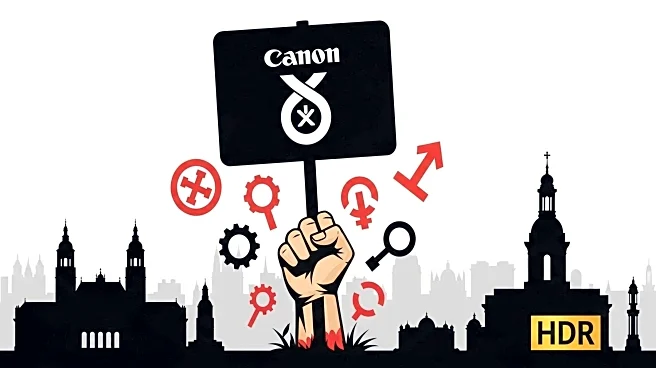What is the story about?
What's Happening?
Hundreds of thousands of workers across France are participating in a nationwide strike to protest against proposed budget cuts. The strikes, organized by trade unions, are a response to economic policies that include significant reductions in public spending. The French interior ministry anticipates between 600,000 and 900,000 demonstrators, deploying 80,000 police officers to manage the protests. The strikes follow the appointment of Sébastien Lecornu as Prime Minister after the fall of François Bayrou's government due to unpopular budget proposals. Public transport disruptions, road blockages, and school closures are reported, with unions demanding increased spending on public services and higher taxes on the wealthy.
Why It's Important?
The strikes highlight widespread discontent with economic policies perceived as favoring the wealthy at the expense of public services. The protests underscore the challenges faced by the new government in addressing France's high public debt while balancing social demands. The situation reflects broader tensions in French society regarding economic inequality and government priorities. The strikes could influence future policy decisions, potentially leading to shifts in budget allocations and tax structures. The outcome may affect France's economic stability and social cohesion, with implications for political dynamics and public trust in government.
What's Next?
Prime Minister Sébastien Lecornu faces the challenge of navigating a divided parliament to reach a compromise on the budget. Ongoing negotiations with opposition parties may lead to adjustments in the proposed cuts or alternative fiscal strategies. The government must address public concerns while managing economic pressures, with potential implications for Lecornu's political future. Continued protests and union actions could shape the government's approach to economic policy, influencing legislative priorities and public spending decisions.
Beyond the Headlines
The strikes reflect deeper societal issues related to economic inequality and the role of government in addressing public needs. The protests may catalyze discussions on the balance between fiscal responsibility and social welfare, prompting debates on taxation and public investment. The situation raises ethical questions about the impact of austerity measures on vulnerable populations and the responsibility of government to ensure equitable access to resources. Long-term effects may include shifts in political alliances and public attitudes towards economic policy.
















